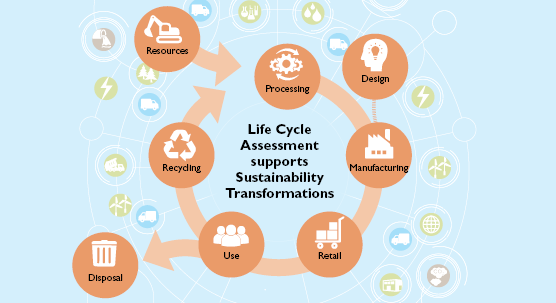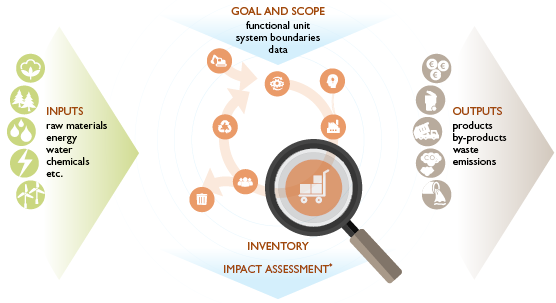Life Cycle Assessment (LCA) is an established method to simultaneously quantify multiple environmental impacts arising from the whole value chain including all processes related to the life cycle of a product or a service. It is an important decision-support tool used by policymakers, authorities, business, and research to identify environmental hotspots and aim at relevant actions to mitigate environmental consequences of human activities.
The increasing adoption of LCA in research, policy, and business calls for multi-stakeholder dialogue. Finnish Environment Institute (Syke) conducts LCA research to provide knowledge supporting decision-making towards a sustainability transformation.
We have collected information about LCA and LCA-related research on this web page. You may use the infographics shown here by mentioning copyright Finnish Environment Institute (Syke).
Current topics from SYKE's LCA research:
Read more about LCA research in Finnish Environment Institute (Syke) here.
LCA is a systemic framework to study complex value chains to assess environmental impacts they cause
LCA is an ISO standardised analytical method to simultaneously quantify multiple environmental impacts arising across the entire life cycle of a product or a service. LCA is a unique tool for exploring the consequences of various decisions and which factors affect the potential impacts.
Life cycles of products or services can be complex, starting from the resources to manufacturing and distribution to users and the end of life of recycling and disposal. In each phase there are different factors to be considered, like energy and water consumption, transport and data networks. These are all taken account for in LCA.

Life cycles of products or services can be complex.
Download large image file here (png). © SYKE
Good quality data is key
An LCA consists of four steps: goal and scope definition, data inventory, impact assessment, and interpretation and dissemination of results. By covering the entire life cycle, and considering multiple environmental impacts, LCA helps to avoid problem shifting between different impacts, as well as within the value chain.
Data inventory is a crucial part of any LCA study in which all relevant inputs and outputs of the analysed system are collected. Inputs include for example raw materials, energy, and water and by-products, waste, and emissions as outputs.
Most common impact categories where the assessment is done include for example climate change, toxicity, eutrophication, resource use, acidification, fine particles, ozone depletion and land use.

Environmental impacts assessed from life cycle inventory data.
Download large image file here (png). © SYKE
Mainstreaming LCA requires teamwork
An accelerated policy development at the European level to drive a systemic sustainability transformation of consumption and production is under way (e.g., the Single Market for Green Products Initiative) and LCA plays an important role in it. The growing need to implement LCA studies necessitates a systematic and harmonised LCA approach on many levels: national policies, public sector initiatives, education curricula, and businesses.
The LCA-based EU Product Environmental Footprint (PEF) method attempts to tackle these challenges by paving the way for a more harmonised LCA-based method that can be used to produce comparable results. Nevertheless, many methodological questions remain open, for example, related to the assessment of biodiversity loss, microplastic pollution or toxic impacts of nanomaterials in the impact assessment.
The coherent implementation of new policy-driven methodology developments (e.g., PEF), real life cases, and enhanced skills of future experts drives the mainstreaming of LCA in a way that serves the information needs for a sustainability transformation. An open, cross-sectoral dialogue and cooperation advances a harmonised uptake of LCA methods.
Research on life cycle methods in Syke
Life Cycle Thinking (LCT) is the core principle of much research carried out in Finnish Environment Institute (Syke). LCT represents a general and holistic approach of considering the full life cycle of products and services but is not as formalised as LCA. To support environmentally conscious decision-making, a combination of research methods is beneficial. Syke offers a large pool of different methods supporting LCA.
LCA contributes to tackling many of the objectives of Syke's strategy. By quantifying climate impacts of products, services, and systems we enhance climate change mitigation and adaptation. By studying environmental impacts of waste management and recycling, and through holistic assessment of new bio-based solutions, we advance the transition to a sustainable circular economy and bioeconomy. LCT is extensively used to support urban and rural areas on their way to becoming forerunners of sustainability. We also explore new research routes to better account for biodiversity loss in LCA and we consider sustainable use of water resources.
Syke contributes to further methodological development of life cycle methods. In addition to LCA, Syke develops the national environmentally extended input-output model ENVIMAT, explores hybrid LCA applications, and applies system-level material flow assessment (MFA), among others. Syke combines deep methodological expertise with a reflexive and critical approach that considers various uses, benefits, uncertainties, and limitations. Thus, Syke applies LCA in a transparent, unbiased, and reliable way to facilitate decision-making towards a sustainability transformation.
Read more from our newest publication
Syke presents: Life Cycle Assessment (LCA), read and download pdf version from ISSUU service.
More information from Syke's LCA experts
- Head of Unit Sampo Soimakallio, scenario analysis, uncertainty and sensitivity analysis
- Senior Research Scientist Susanna Horn, company contacts, metals (electronics), plastics, textiles
- Researcher Jáchym Judl, LCA methodology, PEF, system-level LCA, mobility and transport, digitalization, circular economy
- Senior Research Scientist Johanna Niemistö, LCA use in SMEs
- Researcher Johanna Suikkanen, PEF, ecolabels
Our e-mail addresses are firstname.lastname@syke.fi.